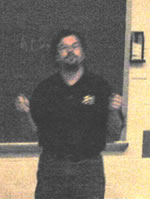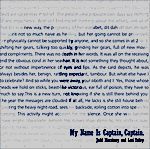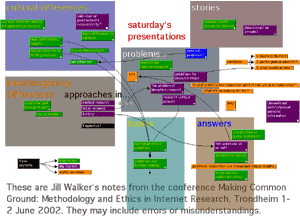Digital History
 Edward L. Ayers opened Hypertext '02 with a stirring, inspiring discussion of the role of hypertext writing in the study of history. His wonderful Valley Of The Shadow site explores, in great depth, two matched counties in the era of the American Civil War. One county is at the Southern edge of the North, the other at the Northern edge of the South, and Ayers has gathered tons of information -- every available letter, diary, newspaper article, farm ledger, everything in sight -- and woven them into a wonderful historical narrative.
Edward L. Ayers opened Hypertext '02 with a stirring, inspiring discussion of the role of hypertext writing in the study of history. His wonderful Valley Of The Shadow site explores, in great depth, two matched counties in the era of the American Civil War. One county is at the Southern edge of the North, the other at the Northern edge of the South, and Ayers has gathered tons of information -- every available letter, diary, newspaper article, farm ledger, everything in sight -- and woven them into a wonderful historical narrative.
In an earlier essay on History in Hypertext, Ayers explains how it works:
In the Valley Project, for example, one often gets the sort of rush that Bush and Darnton describe, that shock that comes from the juxtaposition and connection of the unexpected. To search for a marriage record and come upon a death of a child, to see the heartbreaking ways in which soldiers’ letters use the word "home" arrayed one after another, to juxtapose confident predictions of victory from both sides--all partake of poetry as much as analysis, of association as well as explanation. Yet they tell us something worth knowing about these times and places. And they are created unpredictably, on the fly, in a continuous form of spontaneous poetry. A carefully constructed text could invoke those associations intentionally and to great effect, weaving together source and connection in new ways. (emphasis mine)
Even better: Ayer's 1999 paper on The Pasts and Futures of Digital History.
As anyone who has tried to write history knows, historians either have to hold our temporal breath while we look around or ignore the changing social landscape as we push ahead in time.
Historians might begin to take advantage of the new media, then, by trying to imagine forms of narrative on paper that convey the complexity we see in the digital archives, perhaps emulating writers of fiction in this regard even as we maintain our rigorous fidelity to the evidence. We might acknowledge more frankly the limitations of simple narrative or monographic abstraction. We might try writing in more self-conscious ways, manipulating point of view, chronology, and voice more than in our current practice. This need not be postmodern flight into chaos, but could rather be a more satisfying engagement with the complexity that we know characterized the past.
 Edward L. Ayers opened Hypertext '02 with a stirring, inspiring discussion of the role of hypertext writing in the study of history. His wonderful Valley Of The Shadow site explores, in great depth, two matched counties in the era of the American Civil War. One county is at the Southern edge of the North, the other at the Northern edge of the South, and Ayers has gathered tons of information -- every available letter, diary, newspaper article, farm ledger, everything in sight -- and woven them into a wonderful historical narrative.
Edward L. Ayers opened Hypertext '02 with a stirring, inspiring discussion of the role of hypertext writing in the study of history. His wonderful Valley Of The Shadow site explores, in great depth, two matched counties in the era of the American Civil War. One county is at the Southern edge of the North, the other at the Northern edge of the South, and Ayers has gathered tons of information -- every available letter, diary, newspaper article, farm ledger, everything in sight -- and woven them into a wonderful historical narrative. At Hypertext '02, I had a long and fascinating discussion over Guiness, much noise, and the NBA finals with Frank Shipman and Gene Golovchinsky (at right), exploring issues of interoperating hypertexts. This is a hot topic in research right now, and also hot in the weblog world because Dave Winer's OPML is a distributed system and is built into Radio Userland.
At Hypertext '02, I had a long and fascinating discussion over Guiness, much noise, and the NBA finals with Frank Shipman and Gene Golovchinsky (at right), exploring issues of interoperating hypertexts. This is a hot topic in research right now, and also hot in the weblog world because Dave Winer's OPML is a distributed system and is built into Radio Userland.

